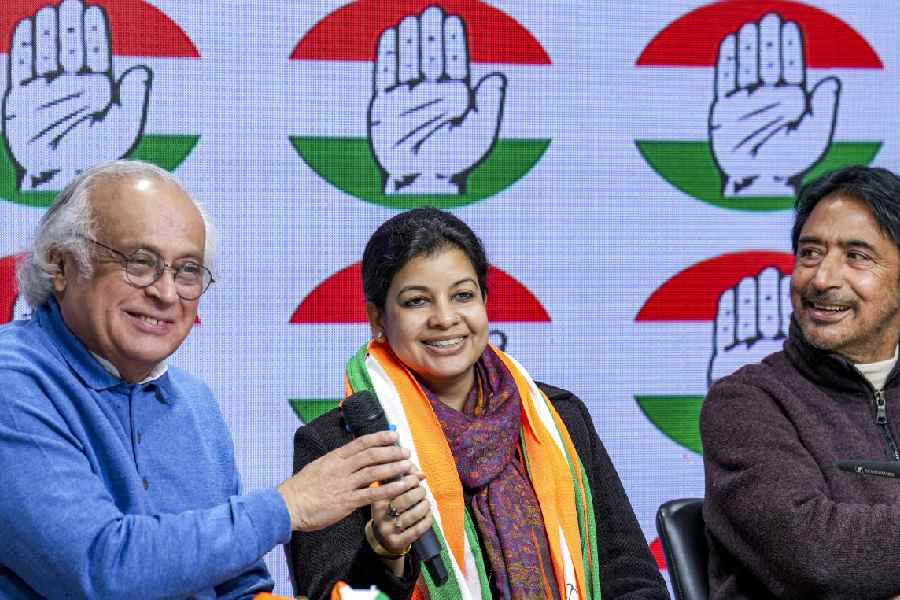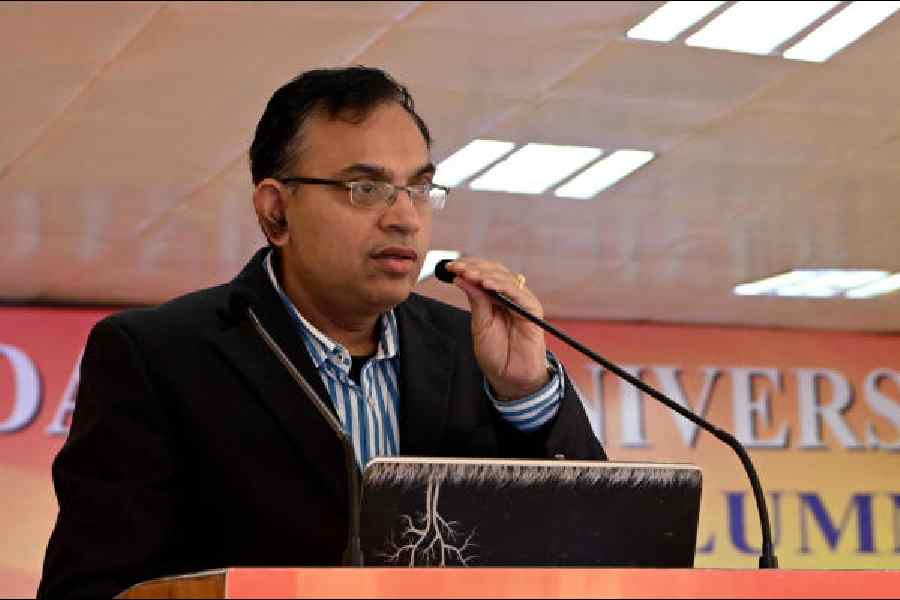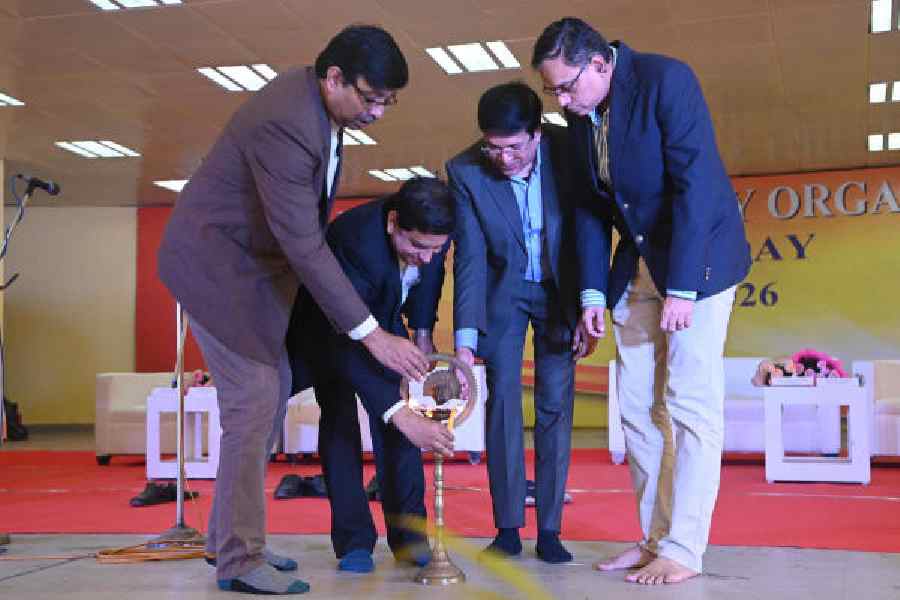 |
| Chimneys of closed factories dot the skyline in Barrackpore. Pictures by Sanjoy Chattopadhyaya |
The grove of trees where he was hanged is now on the grounds of the West Bengal Police Training Academy on the banks of the Hooghly. On most days visitors are barred. Today, it is well nigh impossible to approach because chief minister Mamata Banerjee will land here in her helicopter for a rally in Sodepur.
One hundred and fifty-seven years after the event that created the myths and legends around Mangal Pandey, the soldier who rebelled against the British and changed the course of history in 1857, accessing the haloed ground is still difficult. As if the public cares. No one wants to enter the police grounds unless compelled to, in any case.
Every afternoon, however, young lovers walk through Riverside Road in India’s oldest cantonment and make their way to the ferry ghat by the Mangal Pandey Park. They hire shaded rowboats to go to the other bank or just to the middle of the wide river to exchange intimacies, the boatmen prepared to look the other way for the sake of the business the lovers generate.
On the ride back, the eastern bank of the Hooghly here, from Barrackpore to Shyamnagar, is an expanse of chimneys that pierce the sky like a cardiogram.
Smoke billows from only one or two of them. The Empire Jute Mill is at work on occasional weeks. Loomtex Cotton is shut. Naihati Jute is shut. Gouripore Jute, shut. The ordnance factories, Ishapore Rifle and Metal & Steel, are coping with dwindling orders for guns and bombs but their workers at least have a modicum of government security.
 |
| Dinesh Trivedi campaigns at Bhatpara, Barrackpore |
Bengal Enamel and Mahaluxmi Cotton, both in Palta, are forgotten, their land having been sold for apartment blocks. Dunbar Cotton has sold its real estate. Lakkhi Cotton does not exist, private residential high-rises having already been built on its land. To the north, the Kakinada Paper Mill is shut, as is the Meghni Mill.
Workers of Barrackpore’s sick industries lead measly lives but their unemployment makes them gawkers. At Padmini Kolhapure.
The more industries close down, the greater the uncertainty over wages, the more there is to see in yesteryear Page 3 icons. Some pasts still find resonance in the ramshackle town.
Padmini is at Titagarh’s Tatanagar Gate for a roadshow for Trinamul candidate Dinesh Trivedi. Barrackpore Trunk Road is choked with the supporters and the gawkers.
A young girl pulls her grandmother by the hand, shouting: “Eikhaney, eikhaney, taratari koro (here, here, hurry up), ekkhuni naambey gaari theke (she — Padmini — will be getting off the car any moment).”
Trinamul MP and candidate from Serampore, Kalyan Bandopadhyay, is escorting her (voting in his constituency is over). He gets his boys to form a protective circle before the SUV’s door is opened and the actress gingerly steps out and walks through the crowd to an open jeep from where she waves a wan hand.
“I have to tell you our candidate (Trivedi) will win,” says Narayan Chandra Ray, secretary of the Trinamul-affiliated Bengal Chatkal Mazdoor Union’s Gourishankar union in Shyamnagar, to the north of Titagarh.
The Gourishankar Jute Mill is a rare one. It runs three shifts five days a week. It has about 1,800 workers, permanent, casual and badli. Depending on their status, each worker earns wages of Rs 200 to Rs 400 per day.
 |
| Subhashini Ali campaigns at Palta, Barrackpore |
Ray, the Trinamul union chief, emphasises: “Amay ja bolte hobey, aami tai bolchhi (I’m telling you what I must).”
He admits, though, that Trivedi’s term as MP has meant little to the workers. “We’ve not seen him in five years,” he says.
Ray’s union was affiliated to the Congress’s Intuc before it moved to Trinamul in 2009. He says Somen Mitra was its president. Now Mitra is back with the Congress. The union could move too.
Ray enjoys a rapport with the other union leaders of his mill: Sudha Shankar Yadav of Intuc, Nagender of Citu (the CPM labour arm), and Ashok Das of the Forward Bloc’s TUCC. Nagender and Das are waiting for Left (CPM) candidate Subhashini Ali’s gate meeting that will start at 4.45pm, when the “B” shift workers will go in, and end after 5pm, when the “A” shift workers will leave the mill.
More than 50 per cent of Barrackpore’s 12 lakh voters are from the working class. Subhashini, for all the dissent in her party after her name was first announced, is not new either to the place or to the ways of trade unionism.
Even the “outsider” tag doesn’t sit well on her — three of the four big candidates do not “belong” to Barrackpore. Apart from her, there is sitting MP Trivedi and the BJP’s (former police officer) Romesh Kumar Handa, who is recovering from a car accident.
Only the Congress’s Samrat Tapadar, who broke a hand after an assault on him last week by unidentified goons, is a “son of the soil”.
At the Gourishankar Jute Mill, the union leaders say they are hoping for a consolidation of workers’ votes in favour of the CPM this time.
“In 2009, there was a poriborton’er hawa (wind of change) that is missing this time. Unlike that year, the voters do not see Trinamul playing a role at the Centre,” says Chirantan Ganguly, CPM zonal committee member, who is visiting to help organise the gate meeting.
In 2009, CPM candidate Tarit Topdar, who had won the seat seven times before, was defeated by 56,000 votes. In 2011, Trinamul increased its lead in the seven Assembly segments to nearly 2.19 lakh votes.
Subhashini is exactly on time for the gate meeting, arriving in an SUV unescorted. She was here in 2010 during a 63-day strike by jute mill workers, addressing meetings in the belt from Barrackpore to Kanchrapara.
Workers cycling to the mill wait as Subhashini speaks in Hindi. “Main yahan sirf vote maangne nahin aayi hoon (I’m not here only to seek votes),” she says.
“I’m here to understand how you live. My association with jute mill workers has been long, having come here for the first time in 1970 just after I had joined the party.”
At a tea stall across the road from where Subhashini is speaking, 53-year-old Sadhu Singh says he still has five minutes in hand and will hear her out. It’s bhodrota (politeness) because woh bhi toh bahut door se aai hain (because she too has come from afar).
Contrary to the initial suspicions of some within the party, Subhashini’s clear enunciation in Hindi actually means that many can understand her better than leaders of the party who speak only in Bengali and assume that everyone will understand.
She speaks to them, rather than talking down to them. This — a working-class belt — should be her and her party’s core constituency. But the voter who is a worker has turned cynical.
Subhashini touches on the right issues for the jute industry workers: the dwindling reservation for jute goods in the face of competition from plastic, the ad-hocism in payment of wages and provident fund dues, the profiteering by unscrupulous managements and the sacking of workers.
“Jab se Left ki taqat Parliament mein kam hui hai, mazdooron ki awaz sansad mein le jaaney ke liye koi nahin hai (Since the Left’s presence in Parliament has diminished, there has been no one to carry the workers’ voice to the House),” she says.
“Main yahan aayi hoon aapko yeh bata ne ke liye ki aapko samajhna hain aapki zindagi ke saath rajniti ka kya rishta hain (I’m here to tell you that you have to understand how your life is related to politics).”
The factory siren goes off. The waiting “B” shift workers hurry in. Subhashini knows that a siren will go off again in 15 minutes for the “A” shift to come out. This time the crowd is larger, on both sides of the road, but it does not block traffic.
“Main jaanti hoon ki aat ghante kaam karne ke baad aapko ghar jaane ke liye jaldi hain (I know that after working eight hours, you’d be in a hurry to get home). But I want you to understand that if your voice is silenced, sabke sab Meghna hi Meghna ho jaega (there will be a Meghna everywhere),” she says.
The Meghna Jute Mills was once flourishing but has been closed for years, throwing thousands of workers out of their jobs.
“I promise you that if you vote for us, we’ll again demand reservation for jute sacks” and ensure more orders for the mills to run, she says.
None of this is new to the workers. For 40 years and more, the culture of trade unionism has sat heavy on this region.
“Sab false hai (all lies),” says “B” shift worker Sadhu Singh just before going in. “Jeetne-wala thodi garib aadmi ka baat bolega (the winner never speaks for the poor).”
He walks away.











